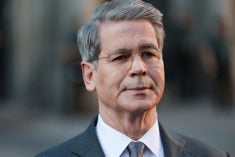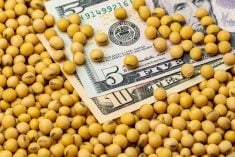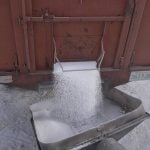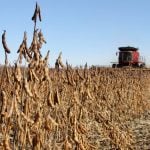The European Union and Canada are expected to close negotiations on a multi-billion-dollar trade deal on Friday that will integrate two of the world’s biggest economies — if they can overcome final disagreements ranging from medicine patents to feta cheese.
Canada’s Prime Minister Stephen Harper and European Commission President Jose Manuel Barroso will meet at around midday in Brussels to wrap up talks that were launched in 2009 but which stalled early this year over demands for greater access to each other’s markets.
“The negotiations have really moved forward, which means that the two leaders will meet tomorrow with the aim of concluding,” Commission spokesman Olivier Bailly said. Harper was due to fly out to Brussels from Ottawa at noon ET.
Read Also

U.S. grains: Soy futures post biggest monthly gain in nearly five years on China trade optimism
U.S. soybean futures climbed to a 15-month high and posted their biggest monthly gain in nearly five years on Friday following a rally fueled by the prospect of revived exports to China.
Harper and Barroso are set to announce the deal — the EU’s first with a member of the G7 club of major economies — at a news conference at 12:30 GMT on Friday, if they can agree final issues including protecting Europe’s distinctive geographically defined products such as feta and Gorgonzola cheeses.
Backed strongly by Canadian and European industry, the accord is expected to increase bilateral trade in goods and services by a fifth to 25.7 billion euros (US$35 billion) a year, according to latest EU estimates.
A deal would be a political achievement for Harper’s free-trade agenda and a step forward for the European Union as the 28-nation bloc seeks to agree a trade deal with the U.S. That pact would be the world’s largest, encompassing half the world economy and a third of world commerce.
For Europe and Canada, the accord would also be one of a new generation of trade pacts that not only remove import tariffs but also harmonize rules on how companies do business across borders. An EU-U.S. deal would likely build on some of the agreements made with Canada to boost transatlantic business.
The EU-Canada pact would eliminate tariffs on almost all goods and services, set larger quotas for EU dairy exports and Canadian beef and pork exports and make it easier for EU carmakers to export vehicles to Canada.
For the first time, provincial governments in Canada would commit to opening their lucrative procurement markets to allow European companies to compete for contracts alongside locals.
EU governments, the European Parliament and the Canadian provinces will still need to approve any EU-Canada deal.
Beef for dairy?
With 95 per cent of the deal done late last year, negotiations ran into trouble in February when EU trade commissioner Karel De Gucht was unable to clinch an agreement after flying to Canada.
Since then, EU and Canadian officials have worked behind the scenes to break the impasse. Harper and Barroso have met three times, most recently at the G20 summit in St. Petersburg, to settle the most difficult issues including patents for pharmaceuticals, dairy products, beef and access to public procurement tenders.
At the heart of the dispute is a Canadian demand to be able to export up to 100,000 tonnes of beef to the EU every year, while the EU wanted to double its exports of dairy products without high tariffs, as well as protecting Europe’s geographically defined products like Greek feta.
People familiar with the talks said such issues had now been resolved, but exact details will still need to be finalised after a political deal between Harper and Barroso.
“There is still lots to be ironed out from a technical point of view, but the political differences look to be bridged to allow the deal to go ahead,” said a person close to the discussions who did not want to be identified.
Canadian beef exports are effectively blocked by the EU at present because they contain hormones. Ottawa has argued it needs a larger quota of hormone-free beef for Europe to make production economically viable.
Beef-producing Irish and French farmers are unhappy with that, while Brussels also needs to leave quota space which the U.S. will seek under a future free-trade deal.
— Robin Emmott and Philip Blenkinsop are senior correspondents for Reuters, based in Brussels.










